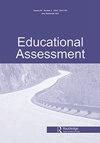Do Students Rapidly Guess Repeatedly over Time? A Longitudinal Analysis of Student Test Disengagement, Background, and Attitudes
IF 2.3
Q1 EDUCATION & EDUCATIONAL RESEARCH
引用次数: 9
Abstract
ABSTRACT Considerable research has examined the use of rapid guessing measures to identify disengaged item responses. However, little is known about students who rapidly guess over the course of several tests. In this study, we use achievement test data from six administrations over three years to investigate whether rapid guessing is a stable trait-like behavior or if rapid guessing is determined mostly by situational variables. Additionally, we examine whether rapid guessing over the course of several tests is associated with certain psychological and background measures. We find that rapid guessing tends to be more state-like compared to academic achievement scores, which are fairly stable. Further, we show that repeated rapid guessing is strongly associated with students’ academic self-efficacy and self-management scores. These findings have implications for detecting rapid guessing and intervening to reduce its effect on observed achievement test scores.学生能否随着时间的推移快速地反复猜测?学生考试脱离、背景和态度的纵向分析
相当多的研究已经检验了使用快速猜测措施来识别不参与的项目反应。然而,人们对那些在几次测试中快速猜出答案的学生知之甚少。在这项研究中,我们使用来自6个行政部门超过三年的成就测试数据来调查快速猜测是一种稳定的特质行为,还是快速猜测主要由情境变量决定。此外,我们研究了在几个测试过程中的快速猜测是否与某些心理和背景测量有关。我们发现,与相当稳定的学业成绩分数相比,快速猜测往往更像一种状态。此外,我们发现重复快速猜测与学生的学业自我效能和自我管理分数密切相关。这些发现对检测快速猜测和干预以减少其对观察到的成就测试分数的影响具有启示意义。
本文章由计算机程序翻译,如有差异,请以英文原文为准。
求助全文
约1分钟内获得全文
求助全文
来源期刊

Educational Assessment
EDUCATION & EDUCATIONAL RESEARCH-
CiteScore
3.20
自引率
6.70%
发文量
24
期刊介绍:
Educational Assessment publishes original research and scholarship on the assessment of individuals, groups, and programs in educational settings. It includes theory, methodological approaches and empirical research in the appraisal of the learning and achievement of students and teachers, young children and adults, and novices and experts. The journal reports on current large-scale testing practices, discusses alternative approaches, presents scholarship on classroom assessment practices and includes assessment topics debated at the national level. It welcomes both conceptual and empirical pieces and encourages articles that provide a strong bridge between theory and/or empirical research and the implications for educational policy and/or practice.
 求助内容:
求助内容: 应助结果提醒方式:
应助结果提醒方式:


